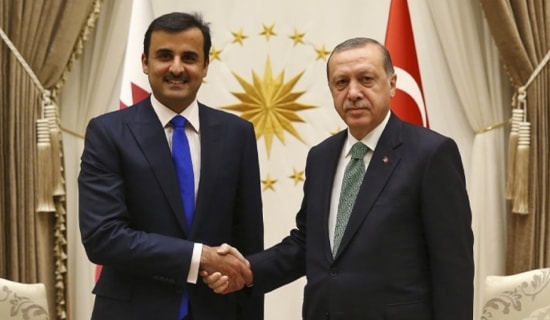Among the reactions published in the Arab press following the election of Muslim Brotherhood (MB) candidate Muhammad Mursi as president of Egypt were two prominent articles by the editors of the large London-based dailies: Tariq Alhomayed, editor of the Saudi Al-Sharq Al-Awsat, and 'Abd Al-Bari 'Atwan, editor of Al-Quds Al-Arabi. Alhomayed did not hide his disappointment at Mursi's election, and warned that the MB's rise to power would lead the region into a dangerous stage. Conversely, 'Atwan, known as a staunch supporter of the resistance axis and as a harsh critic of Saudi Arabia, hailed Mursi's victory as "an unprecedented new chapter in the history of Egypt and the entire region" that would "restore the momentum of the revolution."
The following are excerpts from the articles:
Al-Sharq Al-Awsat Editor: 'Egypt, Fasten Your Seat Belts'
Al-Sharq Al-Awsat editor Tariq Alhomayed wrote: "Following the victory of the Muslim Brotherhood [MB] candidate, Muhammad Mursi, in Egypt's presidential [elections], Egypt and the entire region have entered a new and dangerous stage, whose consequences only Allah can predict. Anyone who feels optimistic... and thinks we are watching a movie that is sure to have a happy ending, is mistaken, and anyone who watches from the sidelines and thinks this is a purely Egyptian affair... is not just mistaken but also negligent.
"Egypt is standing at a real crossroads, which will deeply affect it and the Arab region at large. For the Egyptians, the battle has begun: Will tomorrow's Egypt be like Turkey, [characterized by] a struggle between the MB and the military? If this happens, we must not expect the result in Egypt to be like the result in Turkey, because the Turkish model took a long time [to develop]. Moreover, the experience of the MB in Turkey has been different [from that of the Egyptian MB], and in Egypt there are no signs that an Erdogan-like [leader is emerging]. In fact, the Egyptian MB rejected Erdogan’s advice regarding the necessity to establish a secularist state!
"[Or] will Egypt be like Pakistan, with [a conflict] between the Islamists, the military and also the judiciary? This has heretofore been a bad model, which contains no glimmer of hope. An even worse model is that of the Khomeinist revolution in Iran, which devoured all the political powers and social sectors that supported it.
"Some might claim that the military will be Egypt's guarantee, along with the country's strong judiciary. This is true, but we must remember that Egypt's president is now from the MB; in other words, the MB is ruling the country. That is the reality, and it will have far-reaching consequences on the political, economic, social, religious and cultural levels – not just in Egypt, but throughout the Arab region. Anyone who says that the MB is the reality, so we must deal with it and not criticize it, and other such talk, is mistaken – for those who enter the political playing field must remember that it is always permissible [to criticize them]...
"We must [also] remember that the consequences of the Khomeinist revolution are still affecting the region [today], nearly four decades after it occurred, and that its implications are clearly evident in Lebanon, Iraq, Bahrain and Yemen – not to mention its steep cost [in terms of] the security of the Arab Gulf as a whole. We must remember that the consequences of the Nasserist [revolution in Egypt likewise]... affected not just Egypt, but the entire Arab region, for nearly five decades. They brought about brutal wars and military coups that toppled Arab regimes. The current political coup by the Islamists is no less dangerous than a military coup...
"My words are not [mere] pessimism, but a message to those who have sunk into a deep coma, that they must be wary and fasten their seat belts. For are facing a reality that many believed would never materialize, but it has come to pass and will no doubt have very far-reaching consequences!"[1]
Al-Quds Al-Arabi Editor: 'A Victory Worth Celebrating'
Al-Quds Al-Arabi editor 'Abd Al-Bari 'Atwan wrote under the headline "A Victory Worth Celebrating": "Mere seconds separated the eruption of angry protests and demonstrations in Al-Tahrir Square in the heart of Cairo and the unprecedented joy that restored the momentum and staying power of the revolution, and brought the smiles back to the faces of its millions of supporters throughout Egypt.
"Few countries can make history, and Egypt is undoubtedly among the most prominent of those that can. What happened yesterday was an historic moment, [heralding] an unprecedented new chapter in the history of Egypt and the entire region. Dr. Muhammad Mursi, the MB candidate, is the first [Egyptian] president in decades to ascend to power via transparent democratic elections…
"The Complementary Constitutional Declaration and the dissolving of the Egyptian parliament were two advance steps [by the SCAF] meant to appropriate most of the new president's authorities, leaving him without [authority] and unable to make sovereign decisions.
"President Mursi assumes presidency of [a country with] a divided people, a bankrupt treasury and a high unemployment rate. [He has] the support of less than one quarter of all voters,[2] and, most important, [faces] open Western hostility. This is a minefield that can explode very powerfully, and he must traverse it with minimal losses. This is a difficult task by any standard, since uniting a divided people around an MB leader is no easy challenge. However, it is not impossible – provided that Dr. Mursi and the MB are quick to learn from their past mistakes. When we say past mistakes, we mean their attempt to grab all senior roles in the country – namely the leadership of the parliament, the Shura Council, and the constitution-drafting committee, as well as the republic presidency itself...
"Mursi's victory is a victory for the entire Arab region, and strengthens Arab revolutions [striving] for democracy, human rights, and the restoration of abandoned national pride. Therefore, he must receive the aid and support of Arab countries, especially the rich ones, in order to stimulate Egypt and its economy, since the failure [of the economy] will negatively impact these countries even before it impacts Egypt itself.
"The Israelis are definitely trembling in fear in the face of this victory. Never again will they find a pathetic [Egyptian] president who kneels to lick their feet, submits to all their requests, and assists in all their wars, as [they found] in the past. Egypt is changing, and the wagon of change is accelerating. Change will not stop within [Egypt's] borders, but will penetrate everyone's borders, without exception."[3]




